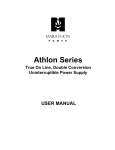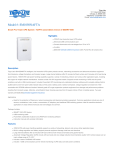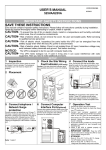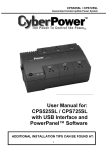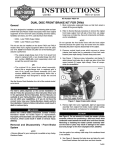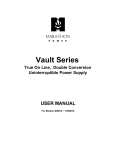Download Marathon Sprint Series User manual
Transcript
Sprint Series
Line-Interactive
Uninterruptible Power Supply
USER MANUAL
Introduction & Important Safety Instructions
Dear Customer,
Thank you for selecting a Marathon Power Uninterruptible Power Supply (UPS). You can rest assured
that you have purchased a product consistent with our reputation for quality and reliability. It will provide
you with years of protection against disruptive and costly powerdisturbances. As future needs arise, we
hope you will consider other products of ours.
Sincerely,
Marathon Power Inc.
2538 E 54th Street
Huntington Park, CA 90255
Tel: 310-689-2328
Fax: 310-689-2329
_______________________________
Please take the time to read this manual!
It provides safety, installation and operating instructions that will allow you to derive the maximum
performance and service life from your UPS.
Please store this manual in a safe place!
It contains important instructions for the safe use of the UPS and for obtaining factory service
should you experience operational difficulties.
Please save or recycle the packaging materials!
They were designed to provide adequate protection from transport related damage. Since damage
sustained during transit is not covered under warrant y, we recommend saving the material in case
the UPS needs to be returned for service or repair. Alternately, please recycle them.
IMPORTANT SAFETY INSTRUCTIONS
SAVE THESE INSTRUCTIONS
1. WARNING (Save These Instructions): This Manual Contains Important Instructions that
should be followed during Installation and Maintenance of the UPS and Batteries.
2. The equipment can be operated by any individual. No previous experience is required.
3. CAUTION (UPS with Internal Batteries): Risk of electric shock - Hazardous live parts inside
this unit are energized from the battery supply even when the input AC power is disconnected.
4. CAUTION (No User Serviceable Parts): Risk of electric shock, do not remove cover. No user
serviceable parts inside. Refer servicing to qualified service personnel.
5. CAUTION (Non-isolated Battery Supply): Risk of electric shock, battery circuit is not isolated
from AC input; hazardous voltage may exist between battery terminals and ground. Test before
touching. Refer to top, rear and/or underside of the unit for cautionary markings.
6. WARNING (Fuses): To reduce the risk of fire, replace only with the same type and rating of fuse.
7. WARNING: Intended for installation in a controlled environment. The maximum ambient
temperature is 77°F / 25°C.
8. CAUTION: When replacing batteries, replace with the same type and number of batteries:
One 12V, sealed lead acid battery, rated at 9Ah (800VA - 2200VA) or 7.2Ah (425VA - 625VA).
9. CAUTION: Do not dispose of batteries in a fire, as they may explode.
10. CAUTION: Do not open or damage the battery, electrolyte may be released which is harmful to
the skin and eyes.
11. CAUTION: A battery can present a risk of electric shock and high short circuit current.
The following precautions should be taken when working with batteries:
a. Remove watches, rings and other jewelry or metal objects.
b. Use only tools with insulated handles.
c. Wear rubber gloves and boots.
d. Do not lay tools or metal parts on top of batteries.
e. Disconnect charging source prior to connecting or disconnecting battery terminals.
12. To reduce the risk of electric shock, disconnect the UPS from the AC input power supply
before installing a communication interface cable. Reconnect the power cord only after
communication interconnections have been made.
13. CAUTION (High Leakage Current - Ground Connection Essential): The total leakage
current for the UPS and any connected equipment shall not exceed 3.5 mA.
14. CAUTION: Risk of electric shock. Heatsink is live. Disconnect unit before servicing.
15. CAUTION (For All 120V Models Only): To reduce risk of fire, connect only to a
circuit provided with 20 amperes maximum branch circuit over-current protection in
accordance with the National Electric Code, ANSI/NFPA 70.
.
Table of Contents
Section
Page
1. Overview . . . . . . . . . . . . . . . . . . . . . . . . . . . . . . . . . . . . . . . . . . . . . . . . . . . . . . . . . . . . . . . . . .1
2. Safety . . . . . . . . . . . . . . . . . . . . . . . . . . . . . . . . . . . . . . . . . . . . . . . . . . . . . . . . . . . . . . . . . . . . .1
3. Functionality . . . . . . . . . . . . . . . . . . . . . . . . . . . . . . . . . . . . . . . . . . . . . . . . . . . . . . . . . . . . . . .2
4. Installation . . . . . . . . . . . . . . . . . . . . . . . . . . . . . . . . . . . . . . . . . . . . . . . . . . . . . . . . . . . . . . . . .4
5. Operation . . . . . . . . . . . . . . . . . . . . . . . . . . . . . . . . . . . . . . . . . . . . . . . . . . . . . . . . . . . . . . . . . .5
6. Alarms . . . . . . . . . . . . . . . . . . . . . . . . . . . . . . . . . . . . . . . . . . . . . . . . . . . . . . . . . . . . . . . . . . . .6
7. Software Options . . . . . . . . . . . . . . . . . . . . . . . . . . . . . . . . . . . . . . . . . . . . . . . . . . . . . . . . . . . .7
8. Care & Maintenance . . . . . . . . . . . . . . . . . . . . . . . . . . . . . . . . . . . . . . . . . . . . . . . . . . . . . . . . .7
9. Computer Interface Port . . . . . . . . . . . . . . . . . . . . . . . . . . . . . . . . . . . . . . . . . . . . . . . . . . . . . .8
10. Battery Replacement . . . . . . . . . . . . . . . . . . . . . . . . . . . . . . . . . . . . . . . . . . . . . . . . . . . . . . . . .8
11. Storage . . . . . . . . . . . . . . . . . . . . . . . . . . . . . . . . . . . . . . . . . . . . . . . . . . . . . . . . . . . . . . . . . . .10
12. Troubleshooting . . . . . . . . . . . . . . . . . . . . . . . . . . . . . . . . . . . . . . . . . . . . . . . . . . . . . . . . . . . .10
13. Specifications . . . . . . . . . . . . . . . . . . . . . . . . . . . . . . . . . . . . . . . . . . . . . . . . . . . . . . . . . . . . .11
14. Product Warranties . . . . . . . . . . . . . . . . . . . . . . . . . . . . . . . . . . . . . . . . . . . . . . . . . . . . . . . . .13
1. Overview
The Sprint series is made up of a broad range of line-interactive models in both Tower and
19" Rack-Mount configurations. Line interactivity implies Automatic Voltage Regulation which
uses buck / boost circuitry to correct for input voltage variations ranging from 75% to 125% of
nominal, without the need to transfer to battery, while maintaining a constant output to the load.
They feature microprocessor control of battery charging and since this is a continuous function,
there is no need to switch the UPS on in order for charging to be activated. To reduce the cost of
ownership, the units turn off automatically ("Sleep Mode") if none of the connected equipment is
operating. There is battery replacement indication and a cyclical self-test function that verifies
both UPS operation and battery condition. They also feature a “cold-start” function that
allows the user to power-up the load directly from the UPS without the availability of utility power.
In addition, the UPS provides single telephone line or modem surge suppression through the
modular connectors on the rear panel, as well as on the AC output receptacles.
Using the UPS with the included software* and interconnecting cable, allows intelligent control
of the system when linked to a host computer. (Some operating systems may require the use of
other optional software).
Dry contacts, accessible via the standard RS-232, connector, allow for remote signalling of basic
functions such as Power Normal, Backup Mode, and Low Battery states as well as Remote Shutdown.
* Software is presently available for PC operating systems only. Later versions may be available
for Macintosh operating systems.
2. Safety
WARNINGS AND CAUTIONS!
Please be aware of, and observe the following:
!
• To reduce the risk of electric shock, disconnect the UPS from the main AC supply before
installing a computer interface cable. Reconnect the power cord only after the signaling
interconnections have been made.
• The internal energy source (the battery) cannot be de-energized by the user. The output may be
energized when the unit is not connected to the AC supply.
• The correct way to de-energize the UPS properly in an emergency is to move the I/O switch to
the OFF position and disconnect the power cord from the main supply.
• Even when the unit is disconnected, risk of electric shock from parts energized by the battery inside the unit
still exists. To avoid this, the battery supply should be disconnected at the positive and negative terminals.
• The outlet sockets should be installed near the equipment and easily accessible.
• Do not dispose of batteries in a fire as they may explode. Please contact tech support for proper
disposal instructions.
• Do not open or attempt to dismantle the battery, as electrolyte that is harmful to the skin and
eyes may be released.
• A battery can present a risk of electric shock and high short circuit current. The following
precautions should be taken when working with them:
- Remove watches, rings and other jewelry or metal objects.
- Use tools with insulated handles.
• To reduce risk of fire, replace only with same type and rating of fuse.
• To reduce the risk of fire or electric shock, install the UPS in a temperature and humidity
controlled indoor area free of conductive contaminants.
1
3. Functionality – Front Views
3.1
425VA / 525VA / 625VA TOWER
800VA / 1000VA / 1200VA / 1500VA / 2200VA TOWER
3.2
3.3
3.4a
3.1
3.8
3.2
3.9
3.3
3.4a
3.4a 3.5 3.6 3.7 3.8
ON/TEST
1500VA / 2200VA RACK-MOUNT
OFF
+
-
-
-
-
-
(not to scale)
3.4b
3.1 3.9 3.2 3.3
3.3
BATTERY FAULT
AC NORMAL
1000VA RACK-MOUNT
UPS1
UPS2
SWITCH
TEST
OFF/ON
BATTERY IN USE
BYPASS
See Note
SILENCE
BUZZER
3.2
3.1
See Note
3.4b
3.1 “REPLACE BATTERY / BATTERY FAULT” Indicator
This LED illuminates when the UPS’s battery is no longer useful and must be replaced. See section 10.
3.2 “BACKUP” Indicator
This LED illuminates when the UPS is supplying battery power to the loads.
3.3 “LINE NORMAL / AC LINE” Indicator
This LED will illuminate when the AC line input voltage is normal.
3.4a “ON / OFF / TEST / SILENCE” Button (All Tower Models)
Once connected, pressing this button for more than 2 seconds turns the UPS ON or OFF. Depressing
it for less than 1 second activates the self-test function (while in normal power mode) or silences the
alarm (while in back-up mode).
3.4b “OFF” Button / Switch (19" Rack-Mount models)
Turns the UPS OFF (and ON in the case of the 1000VA model).
3.5 BATTERY BAR GRAPH (19" Rack-Mount models - 1500VA / 2200VA)
Depressing it for less than 1 second silences the alarm (while in back-up mode).
3.6 LOAD BAR GRAPH (19" Rack-Mount models - 1500VA / 2200VA)
Allows connected equipment to be powered up or down independant of the UPS status.
2
3.7 OVERLOAD Indicator (19" Rack-Mount models - 1500VA / 2200VA)
Allows the UPS to be powered down & serviced without interrupting power to thte connected
equipment.
3.8 “BUCK" (AVR) Indicator
This LED illuminates when the UPS is correcting a voltage swell or over-voltage condition.
3.9 “BOOST" (AVR) Indicator
This LED illuminates when the UPS is correcting a voltage sag or undervoltage condition.
NOTE: 1000VA Rack-Mount model may feature additional controls such as independent load power & bypass switches
3. Functionality – Rear Views
425VA / 525VA / 625VA TOWER
2200VA TOWER
800VA / 1000VA / 1200VA / 1500VA TOWER
3.12
3.8
OFF
3.11
ON
SITE
FIRING
FAULT
REMOTE
PORT
SWITCH REMOTE
PORT
ON
TEL SURGE
PROTECTION
IN
OUT
3.7
3.8
OUT
3.10
3.11
SITE
FIRING
FAULT
OFF
3.12
3.13
3.9
IN
OUTPUT
43.13
OUTPUT
SURGE PROTECTION
3.14
CIRCUIT
BREAKER
3.9
IN PUT
IN PUT
CIRCUIT
BREAKER
3.14
3.10
3.14
3.14
3.10
(not to scale)
1500VA / 2200VA RACK-MOUNT
3.12
1000VA RACK-MOUNT
3.9
3.8
INPUT
REMOTE
IN
OUT
BACK UP
BYPASS
3.8
3.12
3.14
3.10
3.13
3.9
3.7 MAIN POWER SWITCH (800VA, 1000VA, 1200VA, 1500VA & 2200VA)
3.8 COMPUTER INTERFACE
Either an RS-232 (with solid state signaling) or USB port supports various operating systems.
3.9 AC OUTPUT POWER RECEPTACLES WITH BATTERY BACK-UP
3.10 AC INPUT POWER RECEPTACLE / CORD
3.11 SITE WIRING FAULT INDICATOR (RED LED) (Somemodels only)
This LED illuminates when the UPS is connected to an improperly wired AC power outlet.
3
3.12 TELEPHONE / MODEM SURGE PROTECTION Sockets
Surge protection for telephone and modem lines.
3.13 AC SURGE PROTECTION Socket (s) (Some models only)
Surge protection for an additional load. (This outlet is not backed-up).
3.14 INPUT CIRCUIT BREAKER / FUSE
A circuit breaker that trips when the connected loads exceed the protected receptacle’s capacity or
when a short circuit occurs. Press the plunger in the center of the breaker to reset. All other models
have a fuse that blows under the same conditions.
!
CAUTION: Replace only with same fuse type and rating.
4. Installation
4.1 Inspection
Inspect the UPS upon receipt for any visible damage. The packaging is recyclable; save it for reuse
or dispose of it properly.
NOTE: If the power consumption of the load is listed in units other than VA (e.g., Watts), use the
following calculations for conversion:
______ Watts(W) x 1.67 = ______ VA
OR
120V x ______ Amps(A) = ______ VA
4.2 Placement
Install the UPS in a protected area with adequate airflow and free of excessive dust.
!
CAUTION: Do NOT operate the UPS where the temperature and humidity is outside the specified
limits.
4.3 Telephone / Modem Connection
Connect a single line telephone or modem line to the telephone/modem surge protection sockets in
the rear of the UPS. The RJ-45/RJ-11 modular sockets accept standard single line telephone
connectors. This connection requires an additional length of telephone cable (supplied).
NOTE: The telephone/modem line connection is optional and not necessary for the UPS to function
correctly.
!
!
CAUTION: The telephone line current limiting feature may be rendered inoperable if improperly
installed. Make sure that the telephone line from the wall is plugged into the connector labeled “IN”
and the device to be protected (telephone, modem, etc.) is plugged into the connector labeled “OUT”.
CAUTION: This surge protection device is for indoor use only. Never install telephone wiring
during a lightning storm.
4.4 Power Source Connection
Connect the AC power cord to a properly wired and grounded outlet to energize the UPS.
4.5 Battery Charging
The UPS charges its battery whenever it is connected to utility power. For optimum results, charge
the battery for at least 6 hours prior to initial use.
4.6 Load Connection
Plug the load(s) into the output connectors in the rear of the UPS. To use the UPS as a master
ON/OFF switch, make sure all of the loads are switched ON.
!
CAUTION: Do NOT connect a laser printer or plotter to the UPS with other computer equipment.
A laser printer or plotter periodically draws significantly more power when in use, and may
overload the UPS.
4.7 Site Wiring Fault Indicator Inspection (Applicable models only)
After connecting the loads and the UPS, check the site wiring fault indicator on the rear panel. See
section 3 for location of the indicator on the rear panel. It will illuminate if the UPS is connected to
an improperly wired AC power outlet. Wiring faults detected include: no ground, line-neutral
polarity reversal, and overloaded neutral circuit.
4.8 Computer Interface Connection (optional)
A software and interface kit is included with each UPS. If used, ensure that all associated/connected
equipment is OFF and connect one end of the interface cable to the computer interface port (USB or
RS-232) on the back panel of the UPS and the other end to an unused port on the computer.
Use only kits and/or cables supplied or approved by manufacturer. See section 7 for additional info.
NOTE: The computer interface connection is optional and not necessary for the UPS to function correctly.
4.9 Rack Mount Models
Depending on installation, 19" rack-mount applications may require the use of guide rails and/or
brackets to support the weight of the UPS. Please contact the manufacturer of your rack or
enclosure to purchase suitable mounting/installation hardware.
A Note on RFI (Radio Frequency Interference)
There is no guarantee that interference to a radio or TV receiver will not occur in a particular
installation. If the UPS causes interference to radio or television reception, which can be
determined by turning the UPS OFF and ON, the user is encouraged to try to rectify the problem by
trying one or more of following:
• Connect the equipment to an outlet on a circuit different from that to which the receiver is
connected.
• Increase the separation between the equipment and the receiver.
• Re-orient the receiving antenna.
5. Operation
5.1 Turn-ON
1000VA Rack-Mount ONLY Note: To turn the unit on, toggle ON/OFF switch to ON position.
With the UPS plugged in, press the ON/TEST button more than 2 seconds to energize the UPS. It
will perform a self-test each time it is switched ON.
NOTE: When switched OFF, the UPS will maintain and continue to charge the battery and also
respond to commands received through the computer interface port.
5.2 Turn-OFF
1000VA Rack-Mount ONLY Note: To turn the unit off, toggle ON/OFF switch to OFF position.
Press and hold the OFF button until the “LINE NORMAL” or “BACKUP” LED turns OFF.
5.3 Self-Test
Use the self-test to verify both the operation of the UPS and the condition of the battery. To perform
the self-test, press the ON/TEST button more for more than 1 second, but less than 2 seconds, under
normal power conditions. During the self-test, the UPS will operate in back-up mode.
NOTE: During the self-test, the load(s) use battery energy. The “ON BATTERY” LED will illuminate,
(or flash) indicating the UPS is supplying battery power.
If the UPS passes the self-test, it will return to normal on-line operation. The “ON BATTERY” LED
will turn off and the “ON LINE” LED will illuminate.
5
If the UPS fails the self-test, it immediately returns to on-line operation and the “REPLACE
BATTERY” LED will illuminate. The loads are not affected. Recharge the battery overnight and perform the self-test again. If the “REPLACE BATTERY” LED is still illuminated, call tech support for
battery replacement instructions.
5.4 Audible Alarm Silencing
To silence the audible alarm, press the ON/TEST button for less than one second while the UPS is
in back-up mode. On the 1000VA Rack-Mount model, press the BUZZER button
NOTE: This function will not work when the UPS is under “Low Battery” or “Overload” conditions.
NOTE: In back-up mode, the UPS will automatically turn OFF if none of the connected loads are in
operation or if they consume less than 15 watts ("Sleep Mode"). This feature can be disabled if necessary.
5.5 Cold Start
When the UPS is OFF and there is no utility power available or present, the cold start feature can
be used to apply power to the loads from the UPS using the battery as the power source. Press the
ON/TEST button until the UPS beeps.
1000VA Rack-Mount ONLY Note: With UPS unit OFF and no utility power, toggle ON/OFF switch
to ON position
5.6 Shutdown Mode
In this mode, the UPS ceases supplying power to the load while waiting for the return of utility
power. If utility power is not restored, an external device such as a server connected to the
computer via the interface can command the UPS to shutdown. This is typically done to preserve
battery capacity after the proper shutdown of protected loads.
6. Alarms
6.1 “BACKUP” (slow alarm)
When in back-up mode, an LED illuminates (or flashes) and the UPS sounds an audible alarm.
The alarm stops when the UPS returns to LINE NORMAL operation.
The alarm can be silenced by briefly pressing the “ON/TEST” button when the on-battery alarm
sounds.
6.2 “LOW BATTERY” (rapid alarm)
In back-up mode, when the battery level runs low, the UPS beeps rapidly until either the UPS shuts
down due to battery depletion or it returns to LINE NORMAL operation.
6.3 “OVERLOAD” (continuous alarm)
When the UPS is overloaded (i.e., the connected load(s) exceed the maximum rated capacity) the
UPS emits a continuous tone to warn of an overload condition. Disconnect non-critical loads from
the UPS to eliminate the overload.
6.4 “REPLACE BATTERY” (continuous alarm) (Some models only)
The UPS emits a continuous tone and the “REPLACE BATTERY/BATTERY FAULT” LED
illuminates if the battery fails the self-test. See section 10 for instruction on user battery
replacement or contact tech support for assistance.
6
7. Software Options
7.1 Power Monitoring Software
NOTE: Please refer to the back of the software CD holder for installation instructions. For
operational instrucions, install the software, launch the program then click HELP in the upper left
corner of the software application screen.
The software is applied via the standard RS-232 or USB interface to perform monitoring
functions, as well as to implement an orderly shutdown of a computer in the event of a continuous
power failure. In addition, the software displays diagnostic features, such as: input and output
voltage, frequency, battery and load level visually on your computer monitor.
The software is usable with DOS, Windows 95 or higher, Windows NT V3.5 or later, and others.
Contact tech support for more information on alternative computer OS compatible software.
7.2 Interface Kits
Included interface kit provides UPS monitoring. Each kit includes a special cable to convert status
signals from the UPS into signals which individual operating systems recognize. One end of the
cable is connected to the remote port on the UPS and the other end to an used COM or USB
port on the computer.
NOTE: Use only a factory supplied or authorized monitoring cable.
8. Care & Maintenance
1. Keep the unit clean. Wipe with a soft, damp cloth.
2. Check for loose and/or bad connections regularly.
3. Avoid direct sunlight, rain, and high humidity.
4. Keep away from fire and extremely hot locations.
5. Do not stack anything on top of the unit.
6. The unit should not be exposed to corrosive environments.
7. Normal operating temperature is 32 to 104°F (0-40°C).
7
9. Computer Interface Port
The ports are configured as follows:
DB-9 Female Connector
Photocoupler
Normally
Open
8
Low Battery
6
AC Power Failure
5
Common
3
Signal High Min. 1 Second
9
UPS Shut Down or
RS-232 TD PIN 3
2
RS-232 RD PIN 2
7
RS-232 RTS PIN 7
4
RS-232 DTR PIN 4
1
No Connection
Pin Number
10. Battery Replacement
NOTE: Under normal operation, the battery’s life span will be 3-5 years before requiring replacement.
!
CAUTIONS:
• Do NOT dispose of the battery in a fire.
• Do NOT attempt to open or dismantle the battery.
• Remove watches, rings, and other jewelry.
• Use tools with insulated handles.
Marathon Power strongly recommends that the user contact tech support for assistance with battery
replacement.
To change the battery in the 425VA, 525VA & 625VA Tower units:
1. Unplug the UPS unit from the AC power source and disconnect all connected equipment.
2. Disconnect the AC power cord from the UPS.
3. Turn the unit upside down and using a Phillips screwdriver, remove the four (4) screws holding
the top cover of the unit to the bottom section. Store the screws in a safe place.
4. Holding the top together firmly with the bottom, turn the unit right side up.
5. Carefully lift the top cover off and place it to one side. The interconnecting wires and electronics
will be exposed. Be careful not to touch any inner components when changing the battery.
6. Remove the two (2) connecting wires from the battery.
7. The battery can now be removed from the unit.
8
8. Place the new battery in the same position / direction as before and reconnect the wires.
Connect the RED wire to Positive (+) and the BLACK wire to Negative (-).
9. Follow the reverse of steps above to re-assemble the UPS.
10. Follow user manual instructions in section 4 to correctly reconnect the UPS loads.
To change the battery(ies) in the 19" Rack-Mount units:
1. Unplug the UPS unit from the AC power source and disconnect all connected equipment.
2. Remove rack mount brackets..
3. Disconnect the AC power cord from the UPS.
4. Turn the unit upside down and using a Phillips screwdriver, remove screws underneath
and at the back of the unit.
Store the screws in a safe place.
5. Holding the top together firmly with the bottom, turn the unit right side up.
6. Carefully remove the top cover and place it to one side.The interconnecting wires and electronics
will be exposed.
Be careful not to touch any inner components when changing the battery.
7. Remove the securing bracket and two (2) primary connecting wires from the battery(s).
Make sure to take note of the wire location to ensure correct routing during re-assembly.
8. The battery(s) can now be removed from the unit.
9. Place the new battery in the same position / direction as before and reconnect the wires.
Connect the RED wire to Positive (+) and the BLACK wire to Negative (-).
10. Follow the reverse of steps above to re-assemble the UPS.
11. Follow user manual instructions in section 4 to correctly reconnect the UPS loads.
To change the battery(ies) in the 800VA, 1000VA, 1200VA, 1500VA & 2200VA Tower units:
1. Unplug the UPS unit from the AC power source and disconnect all connected equipment.
2. Disconnect the AC power cord from the UPS.
3. Place one hand on top of the unit to secure it. With the appropriate fingers on the other hand
placed in the recesses on either side, gently pull the front panel forward until it disengages. Do
NOT pull it too far forward because there is a wire harness connected to it from the inside of
the unit.
4. The interconnecting wires and electronics will be exposed. Be careful not to touch any inner
components when changing the battery.
5. Disconnect the wire harness and place the panel to one side while the battery is removed.
Alternately, leave it connected and rotate it so that it rests on top of the unit and out of the way.
6. Remove the securing screw and then the battery cover plate.
7. The battery can now be removed from the unit. Slide the battery out, disconnect and discard
accordingly.
8. Place the new battery in the same position / direction as before and reconnect the wires.
Connect the RED wire to Positive (+) and the BLACK wire to Negative (-).
9. Follow the reverse of steps above to re-assemble the UPS.
10. Follow user manual instructions in section 4 to correctly reconnect the UPS loads.
NOTE: For proper battery disposal & recycling information, please call 800-RE-USE-Pb.
(800-738-7372)
9
11. Storage
11.1 Storage Conditions
Store the UPS covered, upright and in a cool, dry location, with its battery fully charged. Before
storing, charge the UPS for at least 4 hours. Remove any accessories from the unit slot and
disconnect any cables connected to the computer interface port to avoid draining the battery.
11.2 Extended Storage
During extended storage in environments where the ambient temperature is +5 to +86°F (-15 to
+30°C ), charge the UPS’s battery every 6 months. During extended storage in environments where
the ambient temperature is +86 to +113°F (+30 to +45°C), charge the UPS‘s battery every 3 months.
12. Troubleshooting
Problem
Unit will not turn ON and/or the
relevant LEDs do not illuminate
Possible Cause
Corrective Action
ON/OFF/TEST/SILENCE button not
pushed or not pushed long enough
Press the ON/OFF/TEST/SILENCE button
for more than 2 seconds
Battery voltage is too low
Recharge the unit for at least 4 hours
Circuit board failure
Call tech support for service
Connected load is less than 20W
in back-up mode
None – this is a normal condition
Loose power cord
Re-insert the power cord
Blown fuse / Tripped Circuit Breaker
Replace the AC fuse / Reset Breaker
Line voltage is too high, too low or
not present
None – this is a normal condition
The unit is functioning as it should
Battery not fully charged
Recharge the unit for at least 4 hours
Circuit board failure
Call tech support for service
Audible alarm sounds
continuously
Overload condition
Disconnect non-critical loads from the unit
Faulty battery
Replace battery
RED LED illuminated
Battery failure
Replace the battery – call tech support
for service
Unit always in back-up mode
Back-up time too short
10
13. Specifications
Tower Models
GENERAL
Rated Capacity:
Technology:
425VA, 525 VA, 625 VA, 800VA, 1000 VA, 1200 VA, 1500VA, 2200VA
Line-interactive topology with simulated sinewave output on battery
INPUT
Phase:
Input Voltages:
Input Voltage Range:
Frequency:
AC Frequency Range:
Input Current (120V):
Input Current (230V):
Input Protection:
DC Bus Voltage:
Single phase plus ground
110V, 115V, 120V or 220V, 230V, 240V
± 25%
50 / 60 Hz auto sensing
45 - 65 Hz
425-3.5A,525-4.4A,625-5.2A,800-6.7A,1000-8.3A,1200-10A,1500-12.5A,2200-18.3A
425-1.8A,525-2.3A,625-2.7A,800-3.5A,1000-4.3A,1200-5.2A,1500-6.5A,2200-9.6A
Fuse or circuit breaker for overload and short circuit (model dependent)
425VA ~ 625VA - 12V, 800VA ~ 1500VA - 24V, 2200VA - 48V
OUTPUT
Output Voltage:
Voltage Regulation:
Power Factor:
Frequency Regulation:
Automatic Voltage Regulation:
Transfer Time:
Efficiency (Standby Mode):
Overload Capacity:
110V, 115V, 120V or 220V, 230V, 240V
± 5% (425VA - 2200VA)
0.6
± 1% (while on battery)
Increases or decreases output voltage by 15% if the input voltage decreases
or increases by between 9% and 25%
Between 2 and 4 milliseconds including detection time
Greater than 95%
110% for 60 seconds, 130% for 3 seconds
19" Rack-Mount Models
GENERAL
Rated power:
Technology:
1000 VA, 1500 VA, 2200 VA
Line-interactive topology with simulated sinewave output on battery
INPUT
Phase:
Input Voltages:
Input Voltage Range:
Frequency:
AC Frequency Range:
Input Current (120V):
Input Current (230V):
Input Protection:
DC Bus Voltage:
Single phase plus ground
110V, 115V, 120V or 220V, 230V, 240V
± 25%
50 / 60 Hz auto-sensing
45 - 65 Hz
1000VA - 8.3A, 1500VA - 12.5A, 2200VA - 18.3A
1000VA - 4.3A, 1500VA - 6.5A, 2200VA - 9.6A
Fuse or circuit breaker for overload and short circuit (model dependent)
1000VA - 18V, 1500VA - 24V, 2200VA - 48V
OUTPUT
Output Voltage:
Voltage Regulation:
Power Factor:
Frequency Regulation:
Automatic Voltage Regulation:
Transfer Time:
Efficiency (Standby Mode):
Overload Capacity:
110V, 115V, 120V or 220V, 230V, 240V
± 5% (1000VA - 2200VA)
0.6
± 1% (while on battery)
Increases or decreases output voltage by 15% if the input voltage decreases
or increases by between 9% and 25%
Between 4 and 8 milliseconds including detection time
Greater than 95%
110% for 60 seconds, 130% for 3 seconds
11
13. Specifications (Cont'd)
All Models
ALARMS AND INDICATORS
Battery Backup:
Battery Low:
Overload:
Front Panel Display:
LED Display Parameters:
(425VA ~ 625VA models)
LED Display Parameters:
(800VA ~ 2200VA models)
Communication (std):
(optional):
Slow beeping tone (approx. 0.25Hz)
Rapid beeping tone (approx. 1.00Hz)
Continuous tone
LED's
On Line (AC normal), On Battery (AC failure), Battery Fault
On Line (AC normal), On Battery (AC failure), Battery Fault, AVR Boost, AVR Buck
RS-232 communication port and solid state signaling or USB
SNMP/WEB card or module for monitoring and control on a network or the internet
STANDARDS
Safety:
Emissions:
Immunity:
Conformity:
Transient Immunity (120V):
Transient Immunity (230V):
EN50091-1-1
EN50091-2 class B
EN50091-2
UL 1778, cUL 107.1, 107.2, (120V models), CE (230V Models)
Per IEEE 62.41 (formerly IEEE 587)
Per IEEE C 61000-4-5 level 3
ENVIRONMENTAL
Ambient temperature range:
Optimum temperature range:
Storage temperature:
Cooling:
Humidity:
Elevation:
Audible noise:
+32 °F to +86°F (+0 °C to +30 °C)
+59 °F to +77°F (+15 °C to +25 °C)
+5 °F to +122°F (-15 °C to +50 °C)
Natural convection (425VA ~ 800VA), Forced air (1000VA ~ 2200VA)
0-95%, non-condensing
10,000 feet max (operation), 45,000 feet (storage)
< 40 db normal and battery mode (All models)
MODEL & PART NUMBER DESIGNATION
120V Tower Models:
120V Tower Models:
230V Tower Models:
230V Tower Models:
120V Rack-Mount Models:
230V Rack-Mount Models:
STWS-0425-01,
STWS-1000-01,
STWS-0425-02,
STWS-1000-02,
SRMS-1000-01,
SRMS-1000-02,
STWS-0525-01,
STWS-1200-01,
STWS-0525-02,
STWS-1200-02,
SRMS-1500-01,
SRMS-1500-02,
12
STWS-0625-01,
STWS-1500-01,
STWS-0625-02,
STWS-1500-02,
SRMS-2200-01
SRMS-2200-02
STWS-0800-01,
STWS-2200-01
STWS-0800-02,
STWS-2200-02
13. Specifications (Cont'd)
Tower Models
Capacity
425VA / 255 W
Input Connection
Backup time
(full load)
800VA / 480 W
Removable IEC cord
6 x NEMA 5-15R (3 backed up and 3 surge only)
Sealed, lead-acid
7.2Ah/12V
Battery Quantity
5 x NEMA 5-15R
Sealed, lead-acid
7.2Ah/12V
Sealed, lead-acid
7.2Ah/12V
Sealed, lead-acid
7.2Ah/12V
1
1
1
2
4 min
4 min
4 min
7 min
Recharge time
<4 hours to 90%
3.8 x 12.6 x 5.3
97 x 320 x 135
Dimensions ins/mm
WxDxH
Weight lbs/kg (net)
625VA / 375 W
Fixed power cord
Output Connection
Battery Type &
Rating
525VA / 315 W
12.8 / 5.8
13.7 / 6.2
1000VA / 600W
1200VA / 720 W
5.1 x 15 x 7.9
130 x 382 x 201
14.3 / 6.5
28.6 / 13
Tower Models
Capacity
Removable IEC power cord
Input Connection
Sealed, lead-acid
7.2Ah/12V
Battery Quantity
Backup time
(full load)
Sealed, lead-acid
7.2Ah/12V
2200VA / 1320 W
Fixed power cord
5 x NEMA 5-15R
Output Connection
Battery Type &
Rating
1500VA / 900 W
6 x NEMA 5-15R
Sealed, lead-acid
7.2Ah/12V
Sealed, lead-acid
7.2Ah/12V
2
2
2
4
6 min
5 min
4 min
6 min
Recharge time
<6 hours to 90%
5.1 x 15 x 7.9
130 x 382 x 201
Dimensions ins/mm
WxDxH
Weight lbs/kg (net)
6.7 x 17.6 x 8.4
170 x 448 x 214
33 / 15
33.4 / 15.2
34.3 / 15.6
66 / 30
600VA / 360W
1000VA / 600 W
1500VA / 900 W
2200VA / 1320 W
19" Rack-mount Models
Capacity
Removable IEC power cord
Input Connection
Battery Type &
Rating
Battery Quantity
Backup time
(full load)
Sealed, lead-acid
7.0Ah/6V
6 x NEMA 5-15R
Sealed, lead-acid
8.0Ah/6V
Sealed, lead-acid
8.5Ah/12V
Sealed, lead-acid
7.2Ah/12V
2
2
2
4
4 min
5 min
5 min
6 min
19 x 14 x 3.3
483 x 357 x 84
19 x 13.8 x 5.1
483 x 351 x 130
35.9 / 16.3
62.6 / 28.4
Recharge time
<8 hours to 90%
19 x 14.3 x 1.73
483 x 362 x 44
Dimensions ins/mm
WxDxH
Weight lbs/kg (net)
Fixed power cord
5 x NEMA 5-15R
Output Connection
20.5 / 9.4
25.3 / 11.5
13
14. Warranty
14.1 Limited Three-Year Warranty and Exclusions
NOTE: For this warranty to be valid, completed registration information must be received within 30 days of original purchase.
Marathon Power warrants to the original purchaser, who must have properly registered the product within
30 days of purchase, and not for the benefit of anyone else that this product at the time of its sale by
Marathon Power is free of defects in materials and workmanship for three (3) years (batteries for 2 years
within the USA, Canada and Mexico, otherwise 1 year) from the original purchase date. Marathon Power
will correct such defects by repair or replacement, at its option, if within such three year period the product is
returned prepaid and all warranty claim instructions are followed. This warranty excludes labor for removal
or reinstallation of this product. This warranty is void if this product is installed improperly or in an improper
environment, overloaded, misused, opened, abused, or altered in any manner, or is not used under normal
operating conditions or not in accordance with all labels or instructions. There are no other or implied
warranties of any kind, including merchantability and fitness for a particular purpose, but if any implied
warranty is required by the applicable jurisdiction, the duration of any such implied warranty, including
merchantability and fitness for a particular purpose, is limited to three years. Marathon Power is not liable
for incidental, indirect, special or consequential damages, including damage to, or loss of use of, any
equipment, lost sales or profits or delay or failure to perform this warranty obligation.
14.2 Limitations & Claims
This warranty does not cover any Marathon Power UPS or any properly connected electronic equipment
which has been improperly installed, overloaded, abused or altered in any manner, or is not used under
normal operating conditions, or in accordance with any labels or instructions, and does not cover any
damage to properly connected electronic equipment resulting from a cause other than a “surge”.
Damage caused by failure to provide a suitable installation environment for the product (including, but
not limited to, lack of a good ground) will not be covered by this warranty. This warranty does not apply
to damage caused by direct lightning strikes, or damage caused by electrical disturbances that exceed
published product specifications. These products are intended to limit the maximum amplitude of transient
voltage surges on power lines to specified values. They are not intended to function as surge arrestors.
The UPS is intended to be installed on the load side of the service entrance and has been tested to verify
that transient voltage surges are limited when subject to non-repetitive transient voltage surge events. This
warranty excludes any incidental, indirect, special or consequential damages, including without limitation,
labor for removal or reinstallation of the Marathon Power UPS or any connected electronic equipment,
data loss or alteration loss of equipment use, lost sales or profits and any such damages for delay or
failure to perform this warranty obligation. This warranty is in lieu of and excludes all implied warranties
of merchantability or fitness for use. In addition, the warranty does not cover restoration of lost data and
reinstallation of software. Some states may not allow the exclusion or limitation of incidental or consequential
damages or other remedies, so the above exclusions or limitations may not apply to you.
Take the following stps to file a warranty claim: Contact us at Marathon Power, Inc., Attn: Returns, 2538 E.
54th Street, Huntington Park, California 90255 or call (310) 689-2328 within 30 days of the occurrence. Be
prepared to provide detailed information about the event, any damage, the UPS model number, purchase
date and location. You will then be provided with a Return Authorization Number (RAN), and be instructed
to forward your proof of purchase (receipt), an explanation of the event and your UPS. If Marathon Power
determines that the damage was due to a “surge”, we may request that all connected equipment be submitted
for evaluation. Marathon Power is not responible for shipping costs. In the event that the equipment has
been damaged by a “surge” Marathon Power will reimburse you for repair or replacement at fair market
value (on a pro rata basis) as indicated by the respective amounts above. The warranty coverage is above
and beyond, only to the extent needed, of that provided by any other source, including but not limited to
any connected equipment coverage, any manufacturer’s warranty or insurance policy. To receive payment
for repair to damage due to a “surge,” the original purchaser should (upon prior approval from Marathon
Power) have such equipment repaired by an authorized service center of such equipment’s manufacturer.
The original purchaser will submit a repair bill along with a statement from the repair facility documenting
the nature of the damage and how it was sustained to said equipment.
14
Copyright Marathon Power, Inc. 2007
www.marathon-power.com
sprintuserman2007rev2




















